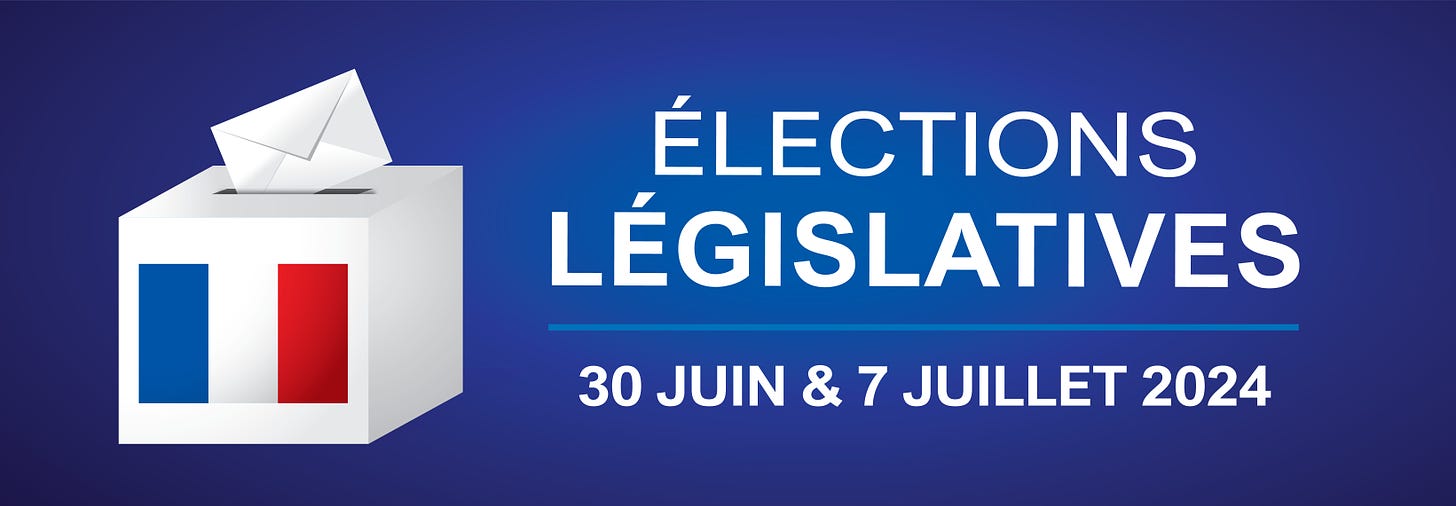Fashion’s Role in Achieving the Sustainable Development Goals by 2030
Plus: From Brexit to Le Pen: What Upcoming Elections Mean for Markets and Fashion
The clock is ticking as the world races towards the 2030 deadline for the United Nations' Sustainable Development Goals (SDGs). With less than six years left, the fashion industry, a global powerhouse, finds itself at a critical juncture. Despite making strides, there remains a significant gap between current practices and the ambitious targets set by the SDGs.
The fashion industry accounts for 10% of global CO₂ emissions, and in the UK alone, one million tonnes of textiles are discarded annually. Garment workers worldwide often earn below a living wage, with modern slavery pervasive in supply chains. Sustainability in the fashion sector continues to lag, and businesses need support to anticipate changing regulations and adapt effectively amidst an ever-evolving ESG landscape.
In response, Fashion Roundtable is partnering with the United Nations Global Compact Network for the Fashion Sector Exchange. This event aims to mobilise key stakeholders across the fashion industry, providing a platform for business, government, academia, and civil society representatives to understand current sustainability issues, learn from best practices, and inspire action through networking.
Event Highlights:
Welcome Remarks and Opening Keynote
14:30 - 14:45
Speakers: Steve Kenzie (UN Global Compact Network UK) and Patrick Grant (Community Clothing)
Slow vs Fast Fashion
14:45 - 15:30
Speakers: Rachel Arthur (UN Environment Programme), Josephine Philips (Sojo), Annabella Ng (Shein), and Lisa Smosarski (Stylist)
Disruption in Supply Chains
15:45 - 16:10
Speakers: Melanie Grant (Responsible Jewellery Council) and Megan Shearer (Monica Vinader)
Next in Sustainable Fashion: Getting Ahead of the Curve
16:10 - 17:00
Speakers: Tamara Cincik (Fashion Roundtable), Tamsin Lejeune (Common Objective), Bex Hall (Sedex), Fashion Roundtable Ambassador and designer Rahemur Rahman, and The Baroness Young of Hornsey
Networking Reception
17:00 - 18:00
Fashion and the SDGs: Where We Stand
No Poverty: Ensure fair wages and decent working conditions. While some brands adopt fair trade practices, many garment workers remain impoverished.
Zero Hunger: Sustainable farming for materials like cotton and wool promotes food security, though the industry’s impact on agriculture is often overlooked.
Good Health and Well-being: Safe working environments and reduced harmful chemicals are critical, yet issues persist.
Quality Education: Scholarships and training programs support education, but more investment is needed in manufacturing communities.
Gender Equality: Ensure equal pay and safe working conditions in a female-dominated workforce. Progress is evident, but gender inequality remains.
Clean Water and Sanitation: The textile industry’s major water consumption and pollution require efficient practices, not yet widespread.
Affordable and Clean Energy: Transitioning to renewable energy can reduce the industry’s carbon footprint, though the shift is slow.
Decent Work and Economic Growth: Fair wages and safe conditions support economic growth. Initiatives exist, but enforcement is challenging.
Industry, Innovation, and Infrastructure: Sustainable infrastructure and innovative technologies are growing, yet more is needed.
Reduced Inequality: Fair labour practices and equitable wages are essential. The industry must support marginalized communities more.
Sustainable Cities and Communities: Local production and waste reduction support urban development, but scalable solutions are required.
Responsible Consumption and Production: Circular fashion and sustainable sourcing align with this goal, with shifting consumer behavior.
Climate Action: Reducing emissions and promoting sustainable practices are vital. Progress exists, but impact remains substantial.
Life Below Water: Reducing plastics and microfibers in textiles protects marine life, requiring more comprehensive actions.
Life on Land: Sustainable sourcing of natural fibers supports ecosystem health. Commitment to biodiversity needs enhancement.
Peace, Justice, and Strong Institutions: Ethical practices and transparency are crucial, with a need for strong labor rights advocacy.
Partnerships for the Goals: Collaboration between brands, governments, and NGOs is vital. The fashion industry must lead in forming impactful partnerships.
Conclusion
Fashion Roundtable is committed to driving the fashion industry towards a sustainable future. Our partnership with the UN Global Compact Network and the Fashion Sector Exchange aims to catalyze action and ensure that by 2030, the fashion industry will lead in achieving the SDGs. Join us at the Fashion Sector Exchange to be part of the change. Together, we can build a sustainable and equitable future for the fashion industry and beyond.
For more information and to register, visit our Eventbrite page.
The French Elections: A Turning Point with Far-Reaching Impacts
As France approaches the first round of its legislative elections on 30th June, the political landscape is more volatile than ever. These elections, called unexpectedly by President Emmanuel Macron following a disappointing performance in the European Parliament elections, are poised to reshape French politics dramatically. The stakes are high, with implications for the economy and sectors like fashion, as well as broader effects on Europe and the upcoming UK general elections.
What's at Stake?
The elections mark a critical juncture for France, pitting Macron's centrist coalition against a resurgent far-right National Rally (RN) led by Marine Le Pen and the hard-left La France Insoumise (LFI) under Jean-Luc Mélenchon. Both Le Pen and Mélenchon have criticized Macron's policies, particularly his economic reforms and immigration stance. Le Pen's RN, buoyed by strong polling, seeks to capitalize on economic dissatisfaction and security concerns, proposing significant changes to France's EU membership terms and national policies.
Macron's decision to dissolve parliament and call for snap elections is seen as a gamble, aiming to force a choice between his centrist policies and the extremes of the political spectrum. This move has sparked intense debates and mobilized political alliances across the spectrum, with leftist parties forming a "New Popular Front" to counter the far-right threat.
The elections are further complicated by the fragmentation of the French political landscape. Multiple small parties, such as the Parti Animaliste and Union Populaire Républicaine, add to the complexity of forming a stable government coalition.
Economic Implications
The economic stakes are substantial. France's economy, already facing challenges from inflation and slow growth, could be further destabilized by political uncertainty. The far-right's economic policies, including potential exits from certain EU agreements and strict immigration controls, pose risks to market stability and investor confidence.
Financial markets have reacted with caution. Historical data suggests that French markets tend to be volatile around election periods, reflecting investor anxiety over potential policy shifts. This is especially true for sectors such as energy, which faces uncertainty over windfall taxes and investment in renewables, and industrial goods, which historically show positive performance leading up to elections.
A recent article from the Financial Times highlights the broader economic recklessness of both the hard-left and hard-right, indicating that policies proposed by these extremes could lead to significant market disruptions. The far-left's plans to nationalize key industries and increase public spending without clear funding mechanisms, and the far-right's potential isolationist economic policies, both pose substantial risks to France's economic stability.
Moreover, whoever wins must beware of market reactions. Investors are particularly wary of policies that could destabilize public finances or lead to increased borrowing costs. France’s debt levels and fiscal discipline will be under scrutiny, with potential ramifications for its credit rating and investor confidence.
Macron's gamble has already had tangible effects on financial markets. Following the announcement of the snap elections, the CAC 40 index in Paris fell by 6%, and French government bonds sold off as investors sought the relative safety of German bonds. This market reaction underscores the heightened uncertainty and potential risks associated with the election outcomes.
Impact on Fashion and the Broader Market
The fashion industry, a cornerstone of the French economy, is particularly sensitive to political and economic shifts. Political stability is crucial for maintaining France's status as a global fashion hub. The potential for policy changes under a new government, whether from the far-right or far-left, could disrupt trade agreements, impact labor laws, and affect consumer confidence, all of which are vital for the fashion sector.
For instance, stricter immigration controls proposed by the far-right could limit the flow of international talent that fuels the French fashion industry. On the other hand, the left's focus on social welfare and workers' rights might increase operational costs for fashion houses. Both scenarios present challenges that could ripple through the industry, affecting everything from design to retail.
Broader European and UK Implications
The outcome of the French elections will also resonate across Europe, particularly in the UK, which faces its own general elections shortly thereafter. The UK markets have shown a pattern of volatility around election times, with sectors like homebuilding, retail, and banking being particularly sensitive to political outcomes. The relationship between France and the UK, already complicated by Brexit, could see new dynamics depending on the election results in both countries.
A far-right victory in France could strain Franco-British relations, especially in areas like trade and defense cooperation. Conversely, a leftist surge might align more closely with potential shifts in UK policy if Labour gains power. In either case, businesses and investors on both sides of the Channel are preparing for significant changes.
The UK markets have historically seen the FTSE 250 perform better than the FTSE 100 in the months leading up to an election, reflecting greater domestic exposure. However, both indices typically experience volatility post-election as investors react to the new political landscape and its implications for public policy and economic performance.
A Cautionary Tale
As the French electorate stands at this critical juncture, there is much to be learned from the UK’s own recent political upheavals. The turbulence following Brexit has shown that drastic political shifts do not necessarily lead to economic prosperity. Instead, they often bring prolonged uncertainty and challenges. The UK's experience serves as a cautionary tale for France's far-right, reminding them that ambitious promises can lead to complex realities that are harder to manage than anticipated.
France’s path forward requires careful consideration and balanced decision-making to avoid the pitfalls seen across the Channel. Investors and citizens alike must brace for turbulent times ahead, understanding that stability and thoughtful policy may offer the best route to sustainable growth and prosperity.
Conclusion
As France heads to the polls, the stakes could not be higher. The elections will not only determine the country's immediate political direction but also have profound implications for its economy and key industries like fashion. Moreover, the ripple effects will be felt across Europe, influencing the UK elections and shaping the future of Franco-British relations. Observers and stakeholders worldwide will be watching closely as this pivotal moment unfolds.
From Brexit to Le Pen: What Upcoming Elections Mean for Markets and Fashion
As we approach the close of another significant election season, with the Labour Party under Keir Starmer poised to win in the UK and Marine Le Pen's National Rally leading in France, it's crucial to understand how markets typically respond to such political changes. Historical data and recent elections provide valuable insights into market reactions and the potential economic implications of these upcoming events.
Market Reactions to Recent UK Elections
2017 General Election: The 2017 UK general election, called by then-Prime Minister Theresa May, aimed to strengthen her mandate for Brexit negotiations. However, the outcome was a hung parliament, with the Conservative Party losing its majority. This unexpected result led to immediate market volatility, with the pound dropping sharply and the FTSE 100 experiencing fluctuations as investors grappled with increased political uncertainty.
2019 General Election: The 2019 UK general election saw the Conservative Party, led by Boris Johnson, secure a decisive victory with a clear mandate to "Get Brexit Done." This outcome was well-received by markets. The FTSE 250, which is more reflective of the domestic economy, showed significant gains due to the clarity and decisiveness of the result. This positive reaction underscored investor relief and optimism about political stability and Brexit resolution.
Brexit Referendum: The Brexit referendum in 2016 caused immediate and significant market turmoil. The unexpected vote to leave the EU led to a sharp decline in the pound and a drop in the FTSE 100, reflecting widespread investor anxiety about the economic future outside the EU. Over time, markets adjusted, but the initial reaction highlighted the profound impact political shocks can have on financial stability.
Market Reactions to Recent French Elections
2017 Presidential Election: Emmanuel Macron's victory in 2017 was met with positive market reactions. His pro-business stance and commitment to EU integration provided a sense of stability, reassuring investors. The CAC 40 saw gains as confidence in economic reforms and continuity grew.
2022 Presidential Election: The 2022 French presidential election saw Macron re-elected, which again brought stability to the markets. However, the legislative elections following his victory resulted in a hung parliament, creating some uncertainty and market fluctuations. The inability to secure a strong parliamentary majority posed challenges for implementing economic policies, causing temporary market jitters.
2024 Legislative Election Prospects: As France heads towards its legislative elections with the far-right National Rally and the far-left La France Insoumise posing significant challenges to Macron's centrist coalition, markets are once again jittery. Recent polls showing strong performances by Le Pen's party have already caused declines in French stocks and government bonds, reflecting fears of fiscal indiscipline and economic upheaval.
General Trends and Predictions
Volatility and Uncertainty: One consistent theme in market reactions to elections is volatility in the face of uncertainty. Markets dislike unpredictability, and the period leading up to elections often sees increased volatility as investors hedge against potential risks. This was evident in both the 2019 UK election and the ongoing situation in France.
Preference for Predictability: Markets tend to favor predictable outcomes. For instance, clear victories or continuity in leadership typically result in positive market responses due to reduced uncertainty. Conversely, close contests or unexpected results can lead to significant market disruptions.
Sectoral Impacts: Different sectors react differently to elections based on anticipated policy changes. The FTSE 250, with its greater exposure to the UK domestic market, often performs better in the lead-up to UK elections compared to the more international FTSE 100. In France, sectors like banking and energy are particularly sensitive to election outcomes due to potential policy shifts regarding regulation and government spending.
Looking Ahead: Labour in the UK and National Rally in France
With Labour expected to win in the UK and the National Rally leading in France, we can anticipate significant market reactions. Labour's policies, focusing on social spending and regulatory changes, might initially unsettle markets, particularly sectors favoring conservative economic policies. However, the clear mandate might also bring some stability post-election as policies become clearer and predictability improves.
In France, a National Rally victory could lead to substantial market turmoil. Le Pen's economic policies, which include significant spending increases and potential EU conflicts, might exacerbate fiscal concerns, leading to increased borrowing costs and investor flight to safer assets like German bonds.
Impact on the Fashion Sector
The fashion industry, a cornerstone of the UK and French economies, is particularly sensitive to political and economic shifts. Political stability is crucial for maintaining both countries' status as global fashion hubs. The potential for policy changes under new governments could disrupt trade agreements, impact labor laws, and affect consumer confidence, all of which are vital for the fashion sector.
UK Fashion Industry Post-Brexit: We at Fashion Roundtable, covered the impact of Brexit in one of our reports; Brexit has introduced significant challenges for the UK fashion industry, which contributed £35 billion to the UK GDP in 2019. The sector heavily relies on export revenues, raw materials from abroad, and a highly complex supply chain. The new post-Brexit trade regime has brought increased costs, delays at borders, and complicated rules of origin, all of which have severely impacted the industry. Many brands have reported losing significant online sales to the EU due to new tariffs and customs procedures.
French Fashion Industry Outlook: In France, the fashion industry faces its own set of challenges with the upcoming elections. A victory by the National Rally could lead to stricter immigration controls, limiting the flow of international talent crucial for the fashion sector. Additionally, potential conflicts with the EU could disrupt supply chains and trade agreements, further impacting the industry.
Both the UK and French fashion industries have shown resilience, with a pivot to digital platforms during the pandemic. However, the upcoming political changes pose new risks that could affect their recovery and growth trajectories. Effective support measures and policies promoting stability and growth will be essential for these industries to thrive in a post-Brexit and potentially post-EU France scenario.
A Cautionary Tale
The UK's Brexit experience serves as a cautionary tale. While drastic political changes can fulfill certain political agendas, they often bring prolonged economic uncertainty and challenges. As both the UK and France brace for potential changes in leadership, markets will be watching closely, balancing between the desire for political stability and the fear of disruptive policy shifts.
Investors and policymakers alike should heed the lessons from recent history, preparing for volatility but also seeking to navigate through it with strategies that prioritize long-term stability and growth. The anticipated changes in both the UK and French political landscapes underscore the importance of stability and thoughtful policy-making in ensuring economic prosperity.
The IPF Forum 2024 Report
Following on from the Institute of Positive Fashion (IPF) Forum back in April, their 2024 Report has just been released. In response to the discussions and solutions explored on the day, and alongside IPF Delivery Collaborator Deloitte, have completed a report that outlines the key learnings and actions from a Government, Citizen and Business standpoint
Key Highlights:
Take a holistic approach across the end-to-end value chain, looking bottom-up as well as top-down.
Collaborate across the industry to share knowledge and improve viability of circular business practices through scale.
Implement circular business models such as repair, rental and resale to promote circularity and reduce waste.
Educate customers in a language they understand and with a two-way dialogue.
Link circularity and decarbonisation, as circular models and use of low impact materials in circular design can ladder up to net zero targets.








Surely the most immediate effect to be considered is on French EPR legislation? Will it be enacted if Le Pen gains power by July 7th?